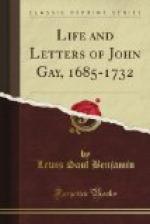he had desired this visit to beg his pardon, that he
had injured him greatly, but that if he lived he should
find that he would make it up to him.’
Gay, on his going to Hanover, had great reason to hope
for some good preferment; but all his views came to
nothing. It is not impossible but that Mr. Addison
might prevent them, from his thinking Gay too well
with some of the great men of the former Ministry.
He did not at all explain himself, in which he had
injured him, and Gay could not guess at anything else
in which he could have injured him so considerably."[14]
It seems, however, more probable that Addison really
had in mind the part he had taken in connection with
“Three Hours After Marriage.” Two
critical publications, “A Complete Key to ’Three
Hours After Marriage,’” and “A Letter
to John Gay, Concerning his late Farce, entitled a
Comedy,” annoyed Gay; while Pope, too, and, in
a minor degree, Arbuthnot, were attacked for their
share in the farce. John Durand Breval, writing
over the signature of Joseph Gay, published in 1717
“The Confederates: A Farce,” in which
he introduced a humorous caricature print of Pope,
Gay and Arbuthnot, so that, says Professor Courthope,
“Pope, at the height of his fame, found himself
credited, though he seems to have had little to do
with it, with the past paternity of a condemned play."[15]
Another incident, recorded by Professor Courthope,
further angered Pope: “While he was still
sore at the mishap, Colley Cibber, playing in ‘The
Rehearsal,’ happened to make an impromptu allusion
to the unlucky farce, saying that he had intended
to introduce the two kings of Brentford, ’one
of them in the shape of a mummy, and t’other
in that of a crocodile.’ The audience laughed,
but Pope, who was in the house, appeared (according
to Cibber’s account) behind the scenes and abused
the actor in unmeasured terms for his impertinence.
Cibber’s only reply was to assure the enraged
poet that, so long as the play was acted, he should
never fail to repeat the same words. He kept
his promise, thus committing the first of that series
of offences which, in the poet’s vindictive
memory, marked him down for elevation to the throne
of Dulness which was rendered vacant by the deposition
of King Tibbald."[16] There is a rumour that Gay, in
revenge for Cibber’s banter of “Three
Hours After Marriage,” personally chastised
the actor-dramatist,[17] but there is nothing definitely
known about this. Anyhow, Gay was so irritated
by the failure of this play that he did not produce
anything at a theatre during the next seven years.
How Gay managed to exist through the three years after the production of “Three Hours After Marriage” is one of the stumbling blocks for the biographer. Of literary achievement during this period his life was barren. It is true that when he was abroad or in the country he was a guest, but even with this his expenses must have amounted to something. As he earned nothing by his pen, unless his friends




